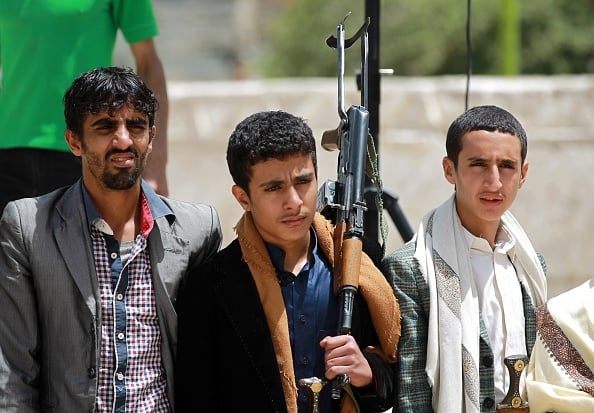Saudi Arabia Trains Yemeni Tribal Fighters In War Against Houthis
So far the fighting and air strikes have killed over 1,000 people since the bombings started on March 26.

Saudi Arabia is providing military training for hundreds of Yemeni tribesmen to fight the Iranian-allied Houthi militia, sources familiar with the matter told Reuters.
A Saudi-led alliance has been bombing the group from the air for over a month, but it remains Yemen’s dominant force.
The Kingdom announced last week it would rein in its strikes to give aid and reconciliation efforts more space, but the warring sides have made no visible progress toward talks.
“You cannot win a war against the Houthis from the air – you need to send ground forces in, but now there’s a programme to train tribal fighters on the border,” said a Doha-based military source familiar with the matter.
This week 300 tribal fighters trained in Saudi Arabia were deployed back to their home area in the Sirwah district of central Marib province to fight the Houthis and managed to push the militia back, a Yemeni official source told Reuters.
A Saudi defence source said there was a plan to bolster Yemeni forces in the battles raging across the country because locals knew the terrain better than Saudis.
“The problem is the number of tribal fighters being trained is very small and not enough,” said the Yemeni source who declined to be named, adding that the training includes giving the fighters light weapons and tactical advice.
ADVERSARY
Saudi Arabia, the world’s top oil exporter and Sunni Muslim regional adversary of Shi’ite Iran, feels threatened by the Shi’ite Houthi advance across Yemen since last September, when the rebels captured the capital.
The Saudi royal in charge of the military campaign in Yemen, Defence Minister Mohammed bin Salman, 30, was named deputy crown prince by his father, King Salman, on Wednesday.
The Saudi-led intervention, closely associated with Prince Mohammed and Interior Minister and Crown Prince Mohammed bin Nayef, is seen by analysts as reflecting a more assertive approach to foreign policy under Salman and his ruling team.
The Houthi gains have forced President Abd-Rabbu Mansour Hadi to flee into exile in Riyadh. The Saudi campaign aims to restore Hadi and prevent Yemen collapsing as a state.
Al Qaeda militants have thrived in the chaos, and the writ of the military and central government has evaporated in the country, which sits astride one of the world’s busiest oil shipping lanes.
Asked about the training, Saudi Arabia’s coalition spokesman, Brigadier Ahmed Asseri, told Reuters he could not comment on operations that were still underway, but did not deny that such training was taking place.
“We always comment on what is achieved. We never comment on something in the future. We don’t want to put the security and safety of any one of the soldiers in danger.”
“We always confirm that we are helping the resistance and the popular groups, the loyal army … but we cannot go into details on where, how, how much,” he said.
UNITING FORCES
In an attempt to cobble together a united tribal front against the Houthis, Saudi Arabia has invited heads of tribes for a meeting in Riyadh, Yemeni sources told Reuters.
Much of the armed opposition to the Houthi advance has been from local southern fighters, many of whom resent the north and seek secession.
“Saudi Arabia wants to unite tribal leaders in this meeting but the feeling is that there’s not much hope for that,” said a Yemeni source currently in Riyadh.
Yemen’s prime minister and newly appointed vice president Khaled Bahah travelled from Riyadh to Doha on Monday to discuss ways of re-establishing the authority of Yemen’s government in exile, sources familiar with the matter said.
One of the options currently under discussion with Gulf states is how to remove al Qaeda elements from the city of Seyoun in the Hadramawt region, which could be a possible base for the government’s administration.
“There’s a growing sense among everyone that if the government officials stay outside of Yemen this in itself will be a gain for the Houthis,” said a Yemeni source.
So far the fighting and air strikes have killed more than 1,000 people, including an estimated 551 civilians since the bombings started on March 26, the United Nations said on Friday. Its children’s agency UNICEF said at least 115 children were among the dead.
